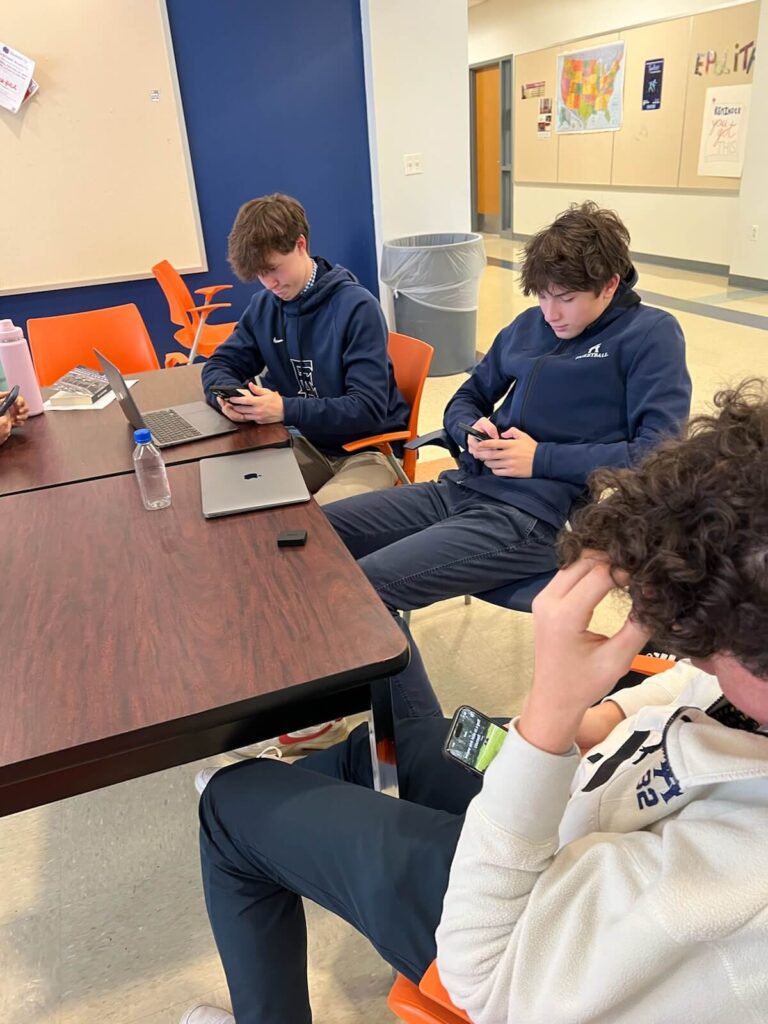Lilly Smolenski ’27
Many parents and child advocates have grown increasingly worried about the amount of time today’s youth spends online and on social media. New reports from the Pew Research Center, published on March 11, 2024, have revealed data regarding the relationship between phone usage and the mental health of U.S. teens.
75% of surveyed teenagers reported feeling happier and more connected to their daily lives when they were not on their phones. According to Pew, 95% of teens in the US have access to phones, with varying opinions on how beneficial this access truly is.
As more parents raise concerns regarding the amount of time children spend online, platforms such as TikTok, Meta, and X have been sued in recent years due to allegations concerning their deliberate installations of addictive features. Nicole Chaikin, Upper School Psychologist, states, “While neither phones or social media are inherently addictive, there are certainly elements of social media that are designed to sustain attention in ways that can lead to promoting problematic or addictive behavior. There are also significant concerns about phone usage’s effects on brain development.”
On the other hand, some believe that user accountability needs to be taken into consideration. Grace Murphy ’24 believes, “Without proper self-control, social media platforms and phones can be addictive. Being able to limit yourself and know that you’ll be better off going to bed a little earlier or doing something a little more productive is the key to being able to restrict the addictiveness.”
Both EA students and faculty have felt the negative impacts of social media. Alison Kurz, Upper School Learning Specialist, explains, “People don’t seem to talk anymore. When groups of both young and old people are out for dinner, everyone is on their phones. There is not as much emphasis on these interactions but [there is] more [emphasis] on your social media presence.” Ryan Wen ’27 adds, “Because of how addicting social media’s personalization of content is, it’s ridiculously hard to not open these apps. This takes valuable time away from doing other tasks, like spending time with family and finishing work. Another con that stems from how much time social media platforms take up is how people no longer just think.” The depletion of human connection is especially noticed in younger generations, with Pew Research Center’s data also showing that 42% of teens found it harder to learn social skills when smartphones are involved.
Although social media has been shown to have negative implications, Chaikin acknowledges that it is a new way for people to form connections. “It can promote healthy relationships such as staying in touch with friends or family, educate and raise awareness, or provide entertainment,” she states. Statistics from the Pew Research Center state that 65% of US teens feel that online access has helped them to be creative, while 69% feel that it is easier to pursue interests when phones are involved in recreational activities.

Photo courtesy of Carter Yearley
Some connections in recent years would not have been possible without social media. Grace Murphy ’24 touched upon her personal experience with the positive aspects of being online: “Connecting with people through social media has definitely been a positive for me. Going to college next year, I have been able to reach out to many people going to Yale as a way to start relationships and get to know some of my future classmates.”
We live in a digital age where technology has a strong grasp on our society. As the digital world continues to influence our lives, we can work on acknowledging both the positive and negative aspects of applications like social media and how they impact our minds.